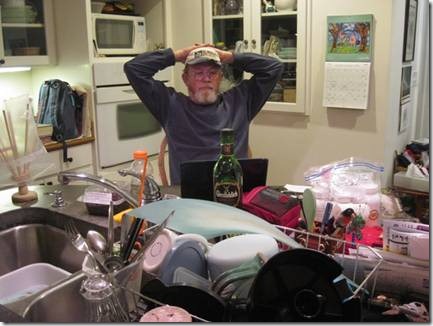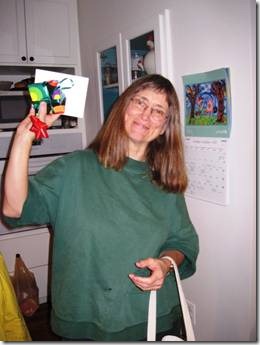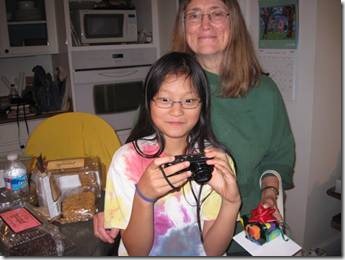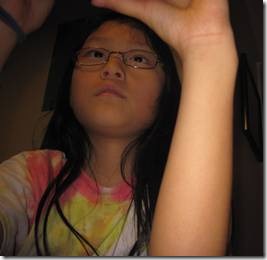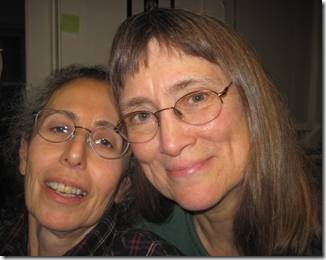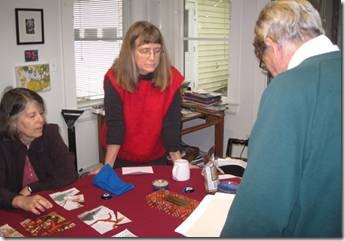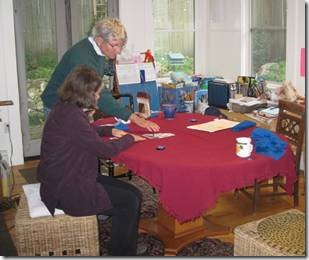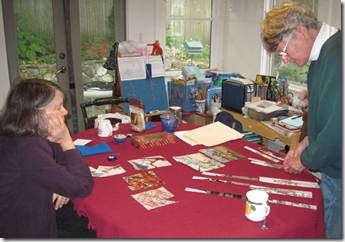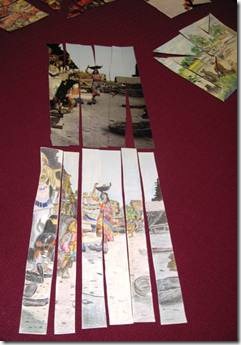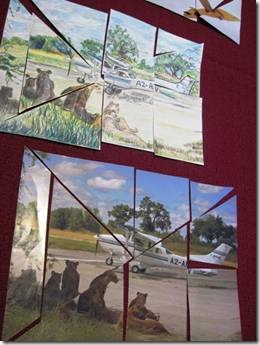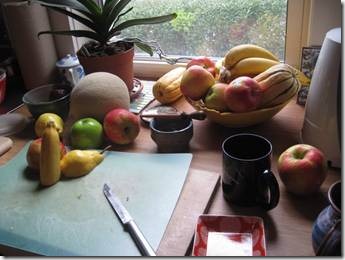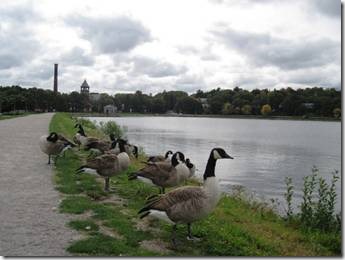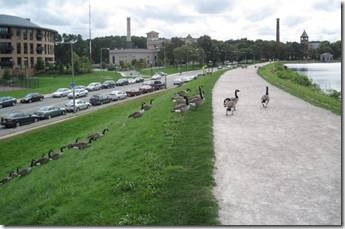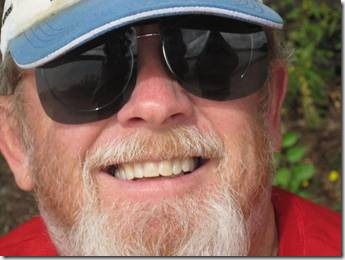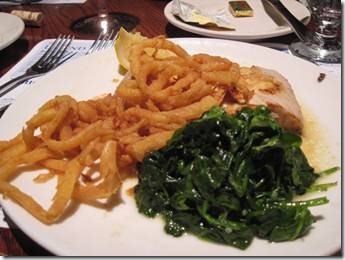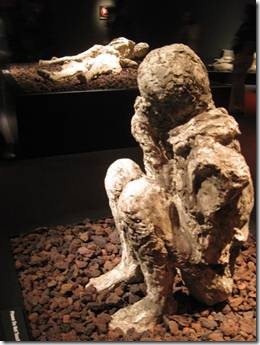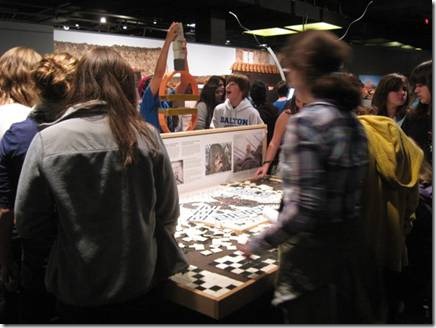Randal is still working on "work stuff" and I’m working on catching up with these emails. We did take time off today to walk the Roanoke River Greenway detouring downtown for lunch. (You knew food was involved, of course.) I’m going to save all of the Roanoke photos for the end so when we travel around the world we can more easily show folks about "home."
This email takes us to our next to last stop, Chestnut Hill (Boston,) Massachusetts to visit Martha and Jessica.
Ru
Martha and Jessica in Chestnut Hill, MA October 2011
Randal made himself right at home with the computer, his relaxing outfit and his Glenfiddich.
A collage of Martha and Jessica
Self-photo with Martha!
Martha and I worked together at the Roanoke County Public Library from 1979 to about 1990? She was “The” Children’s Librarian. Then Martha moved to Boston to take more classes in writing and studying children’s literature. In 2003 Jessica became part of Martha’s family.
Wednesday Art Group
Martha and her “art” group which have been going on for many years. I’ve been lucky enough to join them for their Wednesday morning meetings during our visits north. There’s always first a wonderful breakfast and then they discuss the past week’s art project.
Marion, Martha, and Kitty Marion and Kitty
Marion and Kitty contemplate this week’s project.
A picture had been cut into several pieces: each woman had taken some of the pieces to recreate and then at the meeting the new version was put together to see if it fit and it did!
Another recreated picture and my “still life” with camera…..
I WANT AN ART GROUP!!!!!!!
A short walk from Martha’s and Jessica’s house is the Chestnut Hill Reservoir, 1.56 miles in circumference.
Canada Geese that were born in Boston and never leave.
“Q. Why don’t the Canada geese migrate anymore?
A. Canada geese that nest in Massachusetts are descendants of geese once kept in captivity to be used as live decoys. These birds were released when the use of live decoys was outlawed in 1935. Having been bred in captivity for several generations, these birds never developed a migration tradition which passed down from generation to generation in wild birds. Hence, those geese never learned to migrate, nor did their young. There were only a few geese originally and caused few problems but as the population expanded, doubling every few years, by the 1970s people began complaining about nuisance geese. So it’s not that they don’t migrate anymore, they never did, but with over 30,000 geese in the state now, people are certainly more aware of them. More Canada goose information.”
I thought the Canada Geese were quite appealing especially since they don’t chase you like the wild turkeys that roamed Boston for a while were likely to do. (Madly flashing my bandana made them run away, the turkeys, not the geese which pretty much ignored everyone.) Apparently the geese are a pretty big issue in Boston.
Here are more Q and A from the Massachusetts Wildlife Department……
http://www.mass.gov/dfwele/dfw/wildlife/facts/birds/waterfowl/waterfowl_faqs.htm#canada
Q. Why are we not allowed to hunt Canada geese during the late season in the Cape Cod and Buzzards Bay parts of the coast waterfowl zone? There are plenty of geese.
A. The late Canada goose season did not exist until 1988. Prior to that, the only goose hunting was during the regular waterfowl season which ended January 20 most years. The late season was an extra season designed to harvest resident Canada geese, which had increased to the point of becoming nuisances, after wild geese had migrated through the state. However, we have discovered that many migrant geese that used to winter as far south as North Carolina no longer go that far.
One study found that over 70% of migrant geese from Maritime Canada now winter on Long Island, NY and along the southern New England coast line. Neck collar observations indicated that over 40% of the Canada geese now wintering along Massachusetts’ southern coast are migrant geese, twice as many as allowed for a late resident goose season. You are seeing more Canada geese because more migrant birds are wintering in the southern Coastal waterfowl hunting zone.
Canada Geese Questions
Q. I have a problem with Canada geese. I don’t want them hurt, but will you come move them someplace else?
A. NO. In the late 1960s and early 1970s we did have a program to move nuisance geese, but we simply ran out of places to put them and now there are so many Canada geese in the Atlantic Flyway, nobody else wants them, either. Further, geese fly and most geese will return from great distances back to where they were captured. Fencing is the most effective way to keep geese out of an area in most cases. Please see our Canada goose information.
Q. What can I do to get rid of Canada geese?
A. No special permit is required to harass Canada geese by chasing them, making loud noises, or using scare crow type devices. However, you may not harm the birds. Often you can fence the birds away from your area. You can also develop natural barriers such as dense hedges, or remove what ever is attracting the geese in the first place. You may wish to replace areas of lawn with wood chips or low vegetation like creeping Mrytle or pachysandra which geese do not eat. See the Living with Canada geese link.
You can apply to MassWildlife to addle eggs, which prevents hatching and renesting. See Egg Addling Information on our website.
Swan Questions
Q. I am seeing more and more swans in Massachusetts. Where did these beautiful birds come from?
A. The swans you are seeing are mute swans, and like English sparrows and starlings, they are not native to North America, but an introduced species. Originally brought in from Europe and Asia as ornamental waterfowl to grace the ponds of Long Island estates, some escaped to the wild where they became established, spread up and down the coast and are now moving inland. Highly aggressive and territorial, there is evidence that they are displacing native waterfowl and can be destructive to some aquatic habitats, destroying more vegetation than they actually eat.
Unlike native waterfowl, mute swans were not federally protected until Dec. 2001 when a court ruled that mute swans must be granted federal protection under the same Migratory Bird Treaty that protects native swans, the tundra swan, and the trumpeter swan much to the consternation of people who view the mute swan as a destructive interloper.
Feeding Waterfowl
Q. Why is it okay to feed birds in my back yard, but I’m told not to feed waterfowl?
A. Actually, it is MassWildlife’s policy not to feed any wildlife, but there are no state laws prohibiting feeding. Unlike the birds in your backyard that come to your feeder, eat, and leave, most waterfowl tend to hang around the sites where they are fed. Often, these sites are in municipal areas that are not suitable for most of the other requirements of waterfowl. Artificial feeding can disrupt the normal activities of waterfowl, concentrate the ducks and geese into larger flocks that may increase the chances of disease outbreaks, and not meet their nutritional requirements, particularly in late winter as the breeding season approaches.
Q. The town owns some property by a pond where people like to feed ducks and geese that is getting terribly dirty with droppings and feathers. The town would like to try signage discouraging feeding. Do you have any signs?
A. We don’t have signs, but can suggest some "friendly" text which has been used successfully in some locations: "Keep Wild Things Wild! Please don’t feed the ducks and geese. This can cause the birds to lose their natural fear of people and impact their ability to survive on their own."
Ducks in the Yard
Q. There’s a duck nesting next to my swimming pool. What should I do?
A. Legally, you cannot destroy or move a bird’s nest or eggs. However, neither should you do anything to make the site more attractive to the duck, like feeding it. Many of these nests will never hatch for any of a number of reasons, but if yours does, you will want to herd the duck and brood away from your pool. Ducklings that fall into the pool will likely be unable to get back out. Since a hen is likely to return in future years, you should try to discourage the duck when it first shows up by harassing it, for which no permit is required.
Well, the Canada Geese didn’t bother us and we had a lovely walk that made Randal smile!
Food, of course! But only one photo because we ate everything else up too fast! Martha made a wonderful vegetarian soup of potatoes, garbanzo beans, artichokes and spices and herbs and I had several bowls. She also made some tilapia with some of the long striped squash from my still life photo. The night Jessica had late, afterschool soccer practice we ate Village Fare pizza, the pepperoni half for Jessica and Randal and the Super Veggie half for Martha and me. Teeny tiny Jessica packed away the most, but then she had just been running around soccer practice for an hour. And one night we ate at Legal Seafood. I had bluefish with a lovely mustard sauce, garlic spinach cooked to perfection and onion strings which are perfect with mustard blue fish. We washed it all down with a bottle of Pinot Grigo. We being Martha, Martha’s friend (and so our friend too,) Gerard, Randal and moi. Jessica will have to wait 10 years before she can lift a glass in public.
It was really good and we followed it up with more chocolate cake and some pear crisp that was shared. Jessica had some ice cream that she ate all by herself!
The Boston Museum of Science was having an exhibit about Pompeii so we went off to see it. We drove Gertrude (our GPS) crazy trying to get there, but between Martha’s local knowledge, Randal’s sense of direction and me keeping quiet, we got there. Randal had actually visited Pompeii on his “around the world” bicycle trip so this exhibit, while great for the hundreds of school kids who were there, probably didn’t teach Randal anything he didn’t already know. I actually enjoyed watching the kids. We have rarely interacted with teenagers since we left China, most cruisers being retired folks like us. There are a families who cruise and “home school” their kids and I imagine those kids are getting an amazing education. I hope one day someone studies these “sea schooled” kids to see how they compare to land educated kids.
.
A body cast from Pompeii and a scene depicting the events.
http://www.mos.org/exhibits_shows/current_exhibits&d=4837 is a link to Museum information.
http://www.youtube.com/watch?v=FNeJ-57_vd4&feature=related is a World Book YouTube video explaining what actually killed the people of Pompeii.
The boys seemed to gravitate to the volcano project and the girls to creating images with the mosaic tiles.
More fascinating “flush options.” This one was in the Ladies at the Boston Museum of Science. Very efficient, sort of like our boat.
Other activities…
Martha also took us to several wonderful used book stores and I kept adding to my pile, Randal not so much. You would think he was the one with the Kindle.
That ends our trip too short visit to Boston. Next we drove even further north to Charlotte Island on Lake Sharbot in Ontario to visit Charmaine and Linda, women who, like Randal, took part in the “around the world bike trip.”

